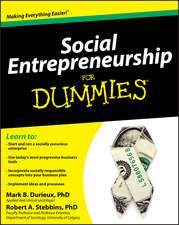The Moral Rhetoric of Political Economy: Justice and Modern Economic Thought: Routledge Frontiers of Political Economy
Autor Paul Turpinen Limba Engleză Paperback – 11 noi 2013
This shift in elevating commutative justice is traced through the moral rhetoric of praise and blame in the political economy of Adam Smith and Milton Friedman. Their theories of the market serve to implicitly position social and market decorum alongside an explicit commutative framework as the condition for a naturally self-regulating market. Their appeal to decorum is presented as a naturally occurring source of social stability. The book examines how these fundamental features of the economic argument represented by Smith and Friedman appear influentially in moral and political philosophy, among critics as well as supporters of the market system. The consistent problem is the persistent neglect of the genesis of individual identity’s constitution in community, resulting in an overvaluation of individualism and an under-acknowledgement of the significance of belonging. Resolving this problem must necessarily focus on making relational complaints about justice part of public discussion again.
This book should be of interest to graduate students and researchers looking at communication or rhetoric in the history of economic thought, political thought as well as moral philosophy and ethics.
| Toate formatele și edițiile | Preț | Express |
|---|---|---|
| Paperback (1) | 409.48 lei 43-57 zile | |
| Taylor & Francis – 11 noi 2013 | 409.48 lei 43-57 zile | |
| Hardback (1) | 1000.13 lei 43-57 zile | |
| Taylor & Francis – 27 ian 2011 | 1000.13 lei 43-57 zile |
Din seria Routledge Frontiers of Political Economy
-
 Preț: 309.90 lei
Preț: 309.90 lei -
 Preț: 309.79 lei
Preț: 309.79 lei -
 Preț: 316.03 lei
Preț: 316.03 lei -
 Preț: 310.55 lei
Preț: 310.55 lei - 9%
 Preț: 866.80 lei
Preț: 866.80 lei -
 Preț: 309.12 lei
Preț: 309.12 lei -
 Preț: 311.61 lei
Preț: 311.61 lei -
 Preț: 286.98 lei
Preț: 286.98 lei -
 Preț: 327.83 lei
Preț: 327.83 lei - 9%
 Preț: 1005.48 lei
Preț: 1005.48 lei -
 Preț: 386.11 lei
Preț: 386.11 lei - 9%
 Preț: 938.47 lei
Preț: 938.47 lei -
 Preț: 302.75 lei
Preț: 302.75 lei -
 Preț: 151.96 lei
Preț: 151.96 lei -
 Preț: 318.54 lei
Preț: 318.54 lei -
 Preț: 317.95 lei
Preț: 317.95 lei -
 Preț: 310.01 lei
Preț: 310.01 lei -
 Preț: 326.49 lei
Preț: 326.49 lei -
 Preț: 155.43 lei
Preț: 155.43 lei -
 Preț: 309.79 lei
Preț: 309.79 lei -
 Preț: 152.66 lei
Preț: 152.66 lei -
 Preț: 328.76 lei
Preț: 328.76 lei -
 Preț: 281.72 lei
Preț: 281.72 lei -
 Preț: 286.58 lei
Preț: 286.58 lei -
 Preț: 325.09 lei
Preț: 325.09 lei -
 Preț: 353.77 lei
Preț: 353.77 lei -
 Preț: 371.95 lei
Preț: 371.95 lei -
 Preț: 310.95 lei
Preț: 310.95 lei -
 Preț: 324.87 lei
Preț: 324.87 lei -
 Preț: 312.86 lei
Preț: 312.86 lei -
 Preț: 374.16 lei
Preț: 374.16 lei -
 Preț: 329.09 lei
Preț: 329.09 lei -
 Preț: 348.21 lei
Preț: 348.21 lei - 28%
 Preț: 1047.06 lei
Preț: 1047.06 lei - 18%
 Preț: 1169.45 lei
Preț: 1169.45 lei - 18%
 Preț: 1555.17 lei
Preț: 1555.17 lei - 18%
 Preț: 1048.43 lei
Preț: 1048.43 lei - 18%
 Preț: 1059.84 lei
Preț: 1059.84 lei - 31%
 Preț: 767.47 lei
Preț: 767.47 lei - 18%
 Preț: 731.92 lei
Preț: 731.92 lei - 26%
 Preț: 822.54 lei
Preț: 822.54 lei - 18%
 Preț: 1796.21 lei
Preț: 1796.21 lei - 26%
 Preț: 1184.91 lei
Preț: 1184.91 lei - 18%
 Preț: 1120.23 lei
Preț: 1120.23 lei - 15%
 Preț: 700.95 lei
Preț: 700.95 lei - 18%
 Preț: 1116.31 lei
Preț: 1116.31 lei - 22%
 Preț: 299.52 lei
Preț: 299.52 lei - 18%
 Preț: 999.46 lei
Preț: 999.46 lei
Preț: 409.48 lei
Nou
Puncte Express: 614
Preț estimativ în valută:
78.35€ • 82.03$ • 64.83£
78.35€ • 82.03$ • 64.83£
Carte tipărită la comandă
Livrare economică 07-21 aprilie
Preluare comenzi: 021 569.72.76
Specificații
ISBN-13: 9780415747431
ISBN-10: 0415747430
Pagini: 192
Dimensiuni: 156 x 234 x 11 mm
Greutate: 0.29 kg
Ediția:1
Editura: Taylor & Francis
Colecția Routledge
Seria Routledge Frontiers of Political Economy
Locul publicării:Oxford, United Kingdom
ISBN-10: 0415747430
Pagini: 192
Dimensiuni: 156 x 234 x 11 mm
Greutate: 0.29 kg
Ediția:1
Editura: Taylor & Francis
Colecția Routledge
Seria Routledge Frontiers of Political Economy
Locul publicării:Oxford, United Kingdom
Public țintă
Postgraduate and UndergraduateCuprins
Introduction 1. Moral Rhetoric and Political Economy 2. Sympathy and Justice in Theory Of Moral Sentiments 3. Sympathy and Moral Horizons in Wealth of Nations 4. The Subordination of Distributive Justice in Milton Friedman’s Capitalism and Freedom 5. The Materialization of Distributive Justice 6. Recognition and the Relational Demands of Distributive Justice 7. Recognition and the Problem of Solidarity
Notă biografică
Paul Turpin is Assistant Professor of Communication at University of the Pacific, USA.
Recenzii
"Turpin brings a fresh and important interpretation to the history of moral thought embedded in political economy. This book presents an impressive multi-disciplinary argument that is provocative, convincing, and consistent with what other observers have noted about the ills of a society modeled on an eighteenth-century ideal…" – Donald E. Frey, Wake Forest University (EH.Net, June 2011)
‘A multidisciplinary perspective that proves expertise in both economy and philosophy, and can be a useful reading for scholars in those fields, as well as for those interested in the general problem of justice and its moral, economic, social and rhetoric implications.’ – Sergiu Bãlan, Department of Philosophy and Social Sciences, the Bucharest Academy of Economic Studies, The Journal of Philosophical Economics, (6:1) 2012
‘A multidisciplinary perspective that proves expertise in both economy and philosophy, and can be a useful reading for scholars in those fields, as well as for those interested in the general problem of justice and its moral, economic, social and rhetoric implications.’ – Sergiu Bãlan, Department of Philosophy and Social Sciences, the Bucharest Academy of Economic Studies, The Journal of Philosophical Economics, (6:1) 2012
Descriere
This book examines the effects of the moral rhetoric of the market concept of justice on our understanding of justice. The shift in elevating commutative justice is traced through the moral rhetoric of praise and blame in the political economy of Adam Smith and Milton Friedman.












